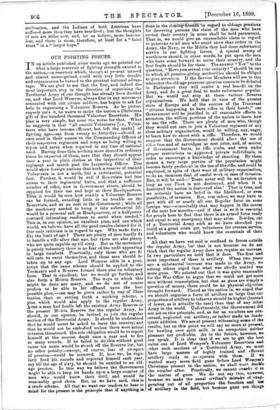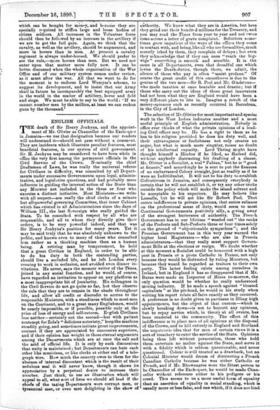OUR FIGHTING FORCES.
TN an article published some weeks ago we pointed out what a large reservoir of fighting strength existed in the nation,—a reservoir which, though at present unused and almost unrecognised, could with very little trouble and organisation he turned to the greatest national advan- tage. We are glad to see that the first, and indeed the most important, step in the direction of organising the Territorial Army of our thought has already been decided on, and that Lord Wemvss, always first in any movement connected with our citizen soldiers, has begun to ask for help in organising a Volunteer Reserve. As he pictur- esquely puts it, he wants to make the nation a Christmas gift of five hundred thousand Volunteer Reservists. His plan is very simple, but none the worse for that. What he suggests is that " all emeriti Volunteers [i.e., Volun- teers who have become efficient, but left the ranks] of fighting age—say from twenty to forty-five—should at once send in their names to the Commanding Officers of their respective regiments and corps as being willing to rejoin and serve when required in any time of national need. Having done this, nothing more should in ordinary times be expected of them, save that they should appear once a year in plain clothes at the inspection of their regiment and march past the Inspecting Officer. This would show foreign nations that such a reserve of trained Volunteers is not a myth, but a substantial, potential fact. Further, it would be well if Reservists had free access to their regimental butts, and that a sufficient number of rifles, now in Government stores, should be supplied for their use and kept at their Headquarters.
Thus it would be seen how readily a Volunteer Reserve can be formed, entailing little or no trouble on the Reservists, and at no cost to the Government ; while all the machinery needed to bring it into substantial life would be a personal call at Headquarters, or a halfpenny postcard intimating readiness to serve when needed." This is, in our opinion, an excellent plan, and one which would, we believe, have all the good results claimed for it. Our only criticism is in regard to age. Why make forty- five the limit of age ? There are plenty of men hardly fit to handle a rifle after that age, but there are also plenty who are quite capable up till sixty. But as the movement is purely voluntary there is no fear of the unfit appearing in large numbers. Practically, only those who are fit will care to enrol themselves, and these men should be taken up to any age. Lord Wemvss adds in a post- script that the same scheme should be applied to the Yeomanry and a Reserve formed there also on voluntary lines. That is excellent, but we would go further, and also form a Militia Reserve. The ways in which this might be done are many, and we do not of course profess to be able to hit offhand upon the best possible plan,—one may be given rather by way of illus- tration than as setting forth a working scheme, a plan which would also apply to the regular Army. Atter a man had finally left the existing Army Reserve or the present Militia Reserve for the regular Army, he should, in our opinion, be invited to join the regular section of the Territorial Army. It should be understood that he would never be asked to leave the country, and that he would not be embodied unless there were actual invasion threatened. His sole obligation would be to report himself at the nearest depot once a year and to fire so many rounds. If he failed to do this without good cause his name would be struck off the Reserve list, but no other penalty—except, of course, loss of prospect of pension—would be incurred. If, how. ver, he regu- larly fired his rounds and reported himself each year, say till the age of sixty, he should be entitled to an old- age pension. In this way we believe the Government might be able to keep its hands upon a large number of men who would know their drill, and would be reasonably good shots. But, as we have said, this is a crude scheme. All that we want our readers to bear in mind for the present is the principle that if anything is
done in the Coretieng-Sessidli in retard to old-age pensions for deserving persons the claim of the men who have served their country in arms shall be held paramount.
That is, we would give an unassailable claim in regard to pensions to all men who could show that either in the Army, the Navy, or the Militia they had done substantial
service in our fighting forces. A special stamp of worthiness should, in other words, be put upon the men
who have come forward to serve their country, and the first fruits should be for them. The answer "Yes" to the question, " Have you served your country ? " should be one to which all pension-giving authorities should be obliged to give attention. If the Service Members will see to this whenever the old-age pensions question comes to be debated in Parliament they will confer a real benefit on the Army, and do a great deal to make enlistment popular. But we would not stop at these various Reserve organisations. We hold that in view of the present state of Europe and of the success of the Transvaal " citizens happening to have rifles in their hands," our Government will be justified in all reasonable efforts to accustom the willing portions of the nation to learn how to use the rifle. There are plenty of men who, though they would not care to join a Volunteer regiment or any close military organisation, would be willing, nay, eager, to learn how to shoot with a rifle. Therefore, we would suggest that the Government should allow the use of rifles free and of cartridges at cost price, and, of course, of Government butts, to rifle clubs, and even under proper restrictions to approved private individuals, in order to encourage a knowledge of shooting. By these
means a very large portion of the population might become fairly proficient in the use of the rifle, and could be employed, in spite of their want of military organisation, to do an immense deal of useful work in case of invasion. But, it will be said—' There never will be an invasion as long as our Fleet is not destroyed, and when it is destroyed the nation is destroyed also.' That is true, and we certainly have no belief in the likelihood, or even possibility, of invasion. But, rem.mber, we may have to part with all or nearly all our Regular force on some foreign war—conceivably that may happen in the course of the next few months—and if that is so it is essential for people here to feel that there is an armed force ready and equal to any emergency that may arise. Besides, out of a Territorial Army such as we have sketched you could at a great crisis get volunteers for oversee service, and volunteers who would know the essentials of their work.
All that we have yet said is confined to forces outside the regular Army, but that is not because we do not think that the regular Army does not require an increase. In two particulars we hold that it does. The first and most important of these is artillery. When two years ago a substantial increase was made in the Army, we among others urged that what was chiefly needed was more guns. We pointed out that it was quite reasonable for the War Office to argue that we could not get more men without conscription, but that as guns are simply a question of money, there could be no physical objection brought forward. Placed as the nation is, we urged that we should organise a force of artillery so large that our proportion of artillery to infantry should be higher (instead of lower, as is actually the case) than that of any other Army in the world. Unfortunately, the Government did not act on this principle, and, as far as numbers are con- cerned, neglected our artillery, or rather made an inade- quate addition. We are at present witnessing some of the results, but on this point we will say no more at present, for howling over spilt milk is an occupation neither pleasant nor profitable. As to the future, however, we can speak. It, is clear that if we are to get the best value out of Lord Wemyss's Volunteer Reservists and other such sections of a Territorial Army, we must have large masses of highly trained and efficient artillery ready to co-operate with them. If we wanted many more field guns before Lord Wemyss's Christmas present to the nation, we shall want double the number after. Practically, we cannot overdo it in the matter of guns. We do not say this, however, because we make the usual civilian's mistake of exag- gerating out of all proportion the function and nee of artillery in the field, but because guns are things
which can be bought for money, and bi-catise they are specially required to stiffen large and loose bodies of citizen soldiers. All increases in the Volunteer force should then be followed by an increase in the artillery if we are to get the full gain. Again, we think that the cavalry, as well as the artillery, should be augmented, and more in horses than in men. At present a cavalry regiment is always under-horsed. We should prefer to see the rule,—more horses than men. But we need not enter upon that matter more fully now. It can be better discussed when the whole organisation of the War Office and of our military system comes under review, as it must after the war. All that we want to do for the moment is to endorse Lord Wemyss's scheme, to suggest its development, and to insist that our Army shall in future be incomparably the best equipped army in the world in the matter of artillery, horse and field and siege. We must be able to say to the world ; ' If we cannot number men by the million, at least we can reckon guns by the thousand.'











































 Previous page
Previous page